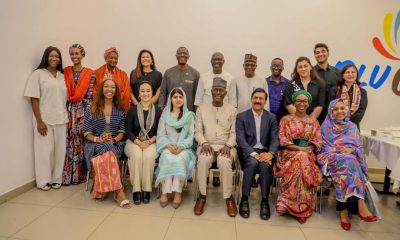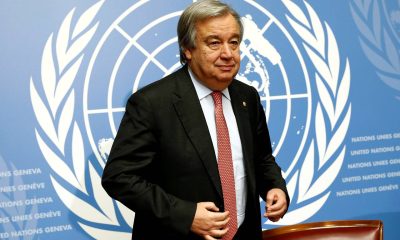FOREIGN NEWS
When Nations Come Together, We Can Overcome Hardest Challenges – UN Resident Coordinator

To promote its advocacy and awareness of the ‘Pact for the Future’ among key stakeholders, the United Nations in Nigeria, in collaboration with partners, convened a strategic dialogue on the United Nations at 80 and the Pact.
The dialogue, organised in partnership with the Institute for Peace and Conflict Resolution (IPCR) and the Office of Strategic Preparedness and Resilience (OSPRE), took place at the UN House in Abuja.
During the event, the UN Resident and Humanitarian Coordinator in Nigeria, Mohamed Fall, emphasised the crucial role of international cooperation in addressing the world’s most pressing issues.
He stated, “Peace is fragile, inequalities are growing, climate change is accelerating, and technology is advancing faster than governance.
” Yet, one truth remains: when nations and people unite, we can overcome even the most formidable challenges.” He added, “That is why the Pact for the Future is so important.”
Fall further explained that the Pact is based on five pillars: Sustainable development, Peace and security, Science and technology, Youth and future generations, and transforming global governance.
He emphasised that these pillars are not abstract concepts but represent the foundation for a world of peace, dignity, equality, and sustainability.
“Therefore, the United Nations is working closely with Nigeria on the Pact for the Future. We are aligning our cooperation with the five pillars of the pact and the 2030 Agenda for Sustainable Development, recognising that progress towards the SDGs is lagging. We are committed to leaving no one behind,” the UN Resident Coordinator added.
In a video message, former Head of State and Chairman of the National Peace Committee, General Abdulsalam Abubakar (Rtd), urged participants: “Dialogue must now translate into tangible results. Our commitment must be credible, time-bound, and deliverable. Anything less risks eroding trust and weakening our democracy.”
He charged the participants to “commit to concrete steps that will align every peacebuilding effort towards real progress. Nigeria’s future will be secured only by our unity of purpose and the sincerity of follow-through.”
The Chargé d’Affaires, a.i. of Nigeria’s Permanent Mission to the United Nations in New York, Ambassador Syndoph Endoni, expressed the Permanent Mission’s appreciation for the dialogue.
He stated that it was not merely an exchange of views but a collective endeavour to effectively realise the Pact for the Future and strengthen Nigeria’s peacebuilding framework.
He disclosed that Nigeria is reviewing existing peacebuilding frameworks and initiatives by identifying key achievements, gaps, and opportunities for reform; prioritizing critical areas of focus, including security sector reform, women’s participation in peace and security, and youth engagement; and addressing cross-border terrorism, organised crime, the proliferation of small arms and light weapons, as well as climate-related security risks.
Speaking at the event, Director of the United Nations’ Team for Pact Implementation, Themba Kalua, highlighted Nigeria’s leading role in this new era of multilateralism.
He stated that Nigeria was an active participant in negotiating the Pact, advocating for progress on poverty eradication, digital cooperation, Security Council reform, and climate justice.
Kalua explained that the Pact for the Future “strongly resonates with Africa’s Agenda 2063. Both envision a just, peaceful, and prosperous continent, driven by inclusive development and regional solidarity.
Aligning the Pact with African priorities and national strategies will be essential to translating words into real change.
Nigeria’s experience and leadership at regional and global levels make it a vital partner in this endeavour.”
The Chairman of the Savannah Centre and Nigeria’s former Minister of Foreign Affairs, Professor Ibrahim Gambari, referenced the New Agenda for Peace, a United Nations policy brief launched in July 2023 by Secretary-General António Guterres, which outlines a vision for strengthening international cooperation to prevent conflict and build sustainable peace.
Gambari, who also served as a former Permanent Representative of Nigeria to the United Nations, emphasised that the Agenda remains a valuable guide for promoting trust, solidarity, and universality through concrete actions.
These include investing in prevention and peacebuilding, empowering women and youth, reducing strategic risks from new technologies and climate change, and adapting to new forms of violence.
-
CRIME4 years ago
PSC Dismisses DCP Abba Kyari, To Be Prosecuted Over Alleged $1.1m Fraud
-
FEATURED4 years ago
2022 Will Brighten Possibility Of Osinbajo Presidency, Says TPP
-
FEATURED2 years ago
Buhari’s Ministers, CEOs Should Be Held Accountable Along With Emefiele, Says Timi Frank
-
BUSINESS & ECONOMY2 years ago
Oyedemi Reigns As 2023’s Real Estate Humanitarian Of The Year
-
SPORTS2 years ago
BREAKING: Jürgen Klopp Quits Liverpool As Manager At End Of Season
-
SPORTS2 years ago
Could Liverpool Afford Kylian Mbappe For €200 million? Wages, Transfer Fee
-
ENTERTAINMENT2 years ago
Veteran Nigerian Musician, Basil Akalonu Dies At 72
-
FEATURED2 years ago
Tribunal Judgement: Peter Obi Warns Of Vanishing Electoral Jurisprudence, Heads To Supreme Court
-
BUSINESS & ECONOMY2 years ago
Oyedemi Bags ‘Next Bulls Award’ As BusinessDay Celebrates Top 25 CEOs/ Business Leaders
-
FEATURED4 years ago
2023 Presidency: South East PDP Aspirants Unite, Demand Party Ticket For Zone



































